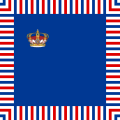Commissioned officer ranks
The rank insignia of commissioned officers.
| Rank group | General / flag officers | Senior officers | Junior officers | |||||||||||||||||||||
|---|---|---|---|---|---|---|---|---|---|---|---|---|---|---|---|---|---|---|---|---|---|---|---|---|
 |  |  |  |  |  |  |  |  |  |  |  |  |  |  |  |  |  |  |  |  |  | |||
| Бојни војвода Bojni vojvoda | Армијски ђенерал Armijski đeneral | Дивизијски ђенерал Divizijski đeneral | Бригадни ђенерал Brigadni đeneral | Пуковник Pukovnik | Потпуковник Potpukovnik | Мајор Major | Капетан прве класе Kapetan prve klase | Капетан друге класе Kapetan druge klase | Поручник Poručnik | Потпоручник Potporučnik | ||||||||||||||
 |  |  |  |  |  |  |  |  |  |  |  |  |  |  |  |  |  |  |  | |||||
| Адмирал Admiral | Вице адмирал Vice admiral | Контра адмирал Kontra admiral | Капетан бојног брода Kapetan bojnog broda | Капетан фрегате Kapetan fregate | Капетан корвете Kapetan korvete | Поручник бојног брода прве класе Poručnik bojnog broda prve klase | Поручник бојног брода друге класе Poručnik bojnog broda druge klase | Поручник фрегате Poručnik fregate | Поручник корвете Poručnik korvete | |||||||||||||||
 |  |  |  |  |  |  |  |  |  |  |  |  |  |  |  |  |  |  |  | |||||
| Армијски ђенерал Armijski đeneral | Дивизијски ђенерал Divizijski đeneral | Бригадни ђенерал Brigadni đeneral | Пуковник Pukovnik | Потпуковник Potpukovnik | Мајор Major | Капетан прве класе Kapetan prve klase | Капетан друге класе Kapetan druge klase | Поручник Poručnik | Потпоручник Potporučnik | |||||||||||||||
| |  |  |  |  |  |  |  |  |  |  |  |  |  |  |  |  | ||||||||
| Жандармеријски бригадни ђенерал Žandarmerijski brigadni đeneral | Жандармеријски пуковник Žandarmerijski pukovnik | Жандармеријски потпуковник Žandarmerijski potpukovnik | Жандармеријски мајор Žandarmerijski major | Жандармеријски капетан прве класе Žandarmerijski kapetan prve klase | Жандармеријски капетан друге класе Žandarmerijski kapetan druge klase | Жандармеријски поручник Žandarmerijski poručnik | Жандармеријски потпоручник Žandarmerijski potporučnik | |||||||||||||||||
| Rank group | General / flag officers | Senior officers | Junior officers | |||||||||||||||||||||
Former insignia
| Rank group | Abolished insignia | |
|---|---|---|
| Rank [4] |  |  |
| Адмирал Admiral | ||
| Established | 11 January 1924 | |
| Abolished | 6 September 1929 | |
Rank flags
| Rank group | General/flag officers | |||
|---|---|---|---|---|
 |  |  |  | |
| Бојни Војвода Bojni Vojvoda | Армијски ђенерал Armijski đeneral | Дивизијски ђенерал Divizijski đeneral | Бригадни ђенерал Brigadni đeneral | |
 |  |  | ||
| Адмирал Admiral | Вице адмирал Vice admiral | Контра адмирал Kontra admiral | ||























